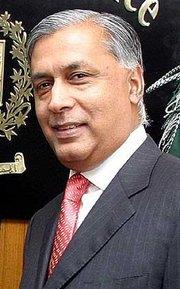
Quite amazing when you think about it.
An IBA man from the then urban wilderness of Nazimabad (circa 1969) makes it good as a young recruit at an influential US bank in Karachi.
Smooth talking and talented he rapidly rises through the ranks of the generally staid and colourless commercial bankers and eventually making it big time at head office in New York. Soon his networking skills among Third World ‘movers and shakers’ becomes the stuff of legend.
Three decades later (after having made approx. US $ 70 million through his entitlement of Citibank share options) Shaukat Aziz was comfortably wealthy but ‘unrich’ and ‘unfamous’ by resident US standards– in other words just another New York banker in a city dominated by multi-billionaires and the mega-rich.
But for Pakistanis he was a local boy who had done amazingly well in a competitive world dominated by WASPs but even so he wasn’t the only desi among Citibank’s senior staffers – Aziz had to share the sub-continental limelight with the likes of equally talented Indians such as Victor Menezes and Rana Talwar.
During the 1990s Aziz became recognized for leveraging his Citibank success on the local Pakistani scene. He became known for currying favour with the likes of Benazir Bhutto, Asif Zardari, Shahbaz Sharif, and a host of Generals – particularly those holding key commands. He also joined the prestigious Sind Club by the extraordinary act of jetting in regularly from Singapore to attend the club’s compulsory introductory meetings.
Then came the Travellers Group ‘takeover’ and a management shake-up which left some Citibankers such as Aziz and Rana Talwar reduced in status. Talwar went on to head Standard Chartered Bank and Aziz became Pakistan’s post-coup Finance Minister. While Victor Menezes went on to become the vice-Chairman of the new Citigroup
In the next few years Aziz did his best – in difficult circumstances - to improve Pakistan’s economy. A tall order for a commercial banker but he managed better than his predecessors but truth is the incidence of backbreaking poverty went on increasing, while paradoxically the rich got even richer – hence his continued popularity among the money making elitist circles.
Then in late 2004 out of the blue he emerged as a compromise candidate for the post of Prime Minister - largely because without a voter base he threatened no one.
In the ‘who-flung-dung’ of Pakistani politics it is difficult to forecast Aziz’s continued survival. The petty and nasty egos that bedevil the local political landscape leave little room for Aziz’s masterfully polished art of smooth talking – success in a setting of chilled champagne and iced oysters may not work as well in an environment offering at times nothing more than tepid mango juice and congealing karahi ghost.


No comments:
Post a Comment